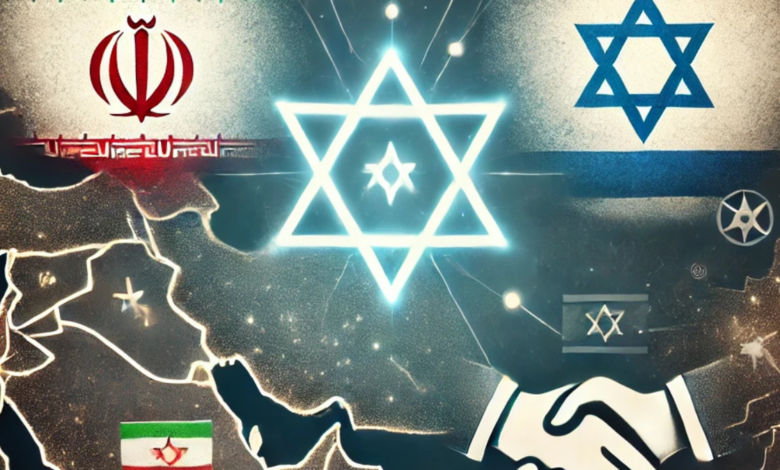Exploring Iran Israel Rivalry: From Ideology to Proxy Wars

The relationship between Iran and Israel has been one of the most complex and contentious in modern history. This rivalry, rooted in ideological, political, and strategic differences, has not only shaped the geopolitics of the Middle East but has also influenced global policies and alliances. From ideological clashes to proxy wars, the Iran Israel rivalry is a key issue that continues to dominate international discussions. In this article, we will delve into the origins, evolution, and current state of this multifaceted conflict.
Historical Context of the Iran Israel Rivalry
The Pre-Revolution Era
Before the 1979 Iranian Revolution, Iran and Israel maintained relatively friendly relations. Under the Shah’s regime, Iran recognized Israel and cooperated with it in areas such as trade, intelligence, and security. Both nations shared a common interest in countering Arab nationalism, particularly under Egyptian President Gamal Abdel Nasser.
The Iranian Revolution and Its Impact
The 1979 Iranian Revolution marked a turning point in Iran Israel relations. The new Islamic Republic of Iran, led by Ayatollah Khomeini, adopted an anti-Israel stance, labeling Israel a “Zionist regime” and expressing strong support for the Palestinian cause. This shift was driven by ideological factors, as Iran sought to position itself as a leader of the Islamic world and an opponent of Western influence in the region.
Key Drivers of the Rivalry
- Ideological Clashes
At the heart of the Iran Israel rivalry is a deep ideological divide. Iran’s theocratic regime views Israel as a colonial outpost of Western powers, while Israel sees Iran’s revolutionary rhetoric and actions as an existential threat. This ideological clash fuels hostility on both sides and shapes their respective foreign policies.
- Regional Hegemony
Both Iran and Israel aspire to be dominant powers in the Middle East. Iran’s efforts to expand its influence through alliances with groups like Hezbollah in Lebanon and Hamas in Gaza challenge Israel’s security and strategic interests. Conversely, Israel’s alliances with Gulf states and Western powers counterbalance Iran’s regional ambitions.
- The Nuclear Issue
Iran’s nuclear program is a major point of contention. While Iran insists its program is for peaceful purposes, Israel views it as a direct threat to its existence. Israel has consistently advocated for stringent measures to prevent Iran from acquiring nuclear weapons, including lobbying for international sanctions and engaging in covert operations to disrupt Iran’s nuclear development.
Proxy Wars and Regional Conflicts
The Iran Israel rivalry has increasingly played out through proxy wars across the Middle East. Iran supports non-state actors such as Hezbollah, Hamas, and the Houthis in Yemen, providing them with financial, military, and logistical assistance. These groups frequently engage in hostilities with Israel, adding layers of complexity to the conflict.
- Lebanon and Hezbollah
Hezbollah, a Shia militant group backed by Iran, is a key player in the Iran Israel conflict. Since its founding in the 1980s, Hezbollah has been involved in numerous conflicts with Israel, including the 2006 Lebanon War. Iran’s support for Hezbollah underscores its strategy of using proxy forces to challenge Israel’s security.
- Gaza and Hamas
Iran’s support for Hamas, a Sunni Islamist group, highlights the strategic rather than purely sectarian nature of its policies. Hamas frequently engages in rocket attacks and other hostilities against Israel, with Iran playing a crucial role in supplying weapons and funding.
- Syria and Beyond
The Syrian Civil War has become another battleground for the Iran Israel rivalry. Iran’s support for the Assad regime and its establishment of military bases in Syria have provoked Israeli airstrikes aimed at curbing Iranian influence near its borders.
International Dimensions
- U.S. Involvement
The United States is a significant player in the Iran Israel rivalry, providing unwavering support to Israel while imposing sanctions on Iran. The U.S. withdrawal from the Iran nuclear deal in 2018 further escalated tensions, as Israel supported the move and Iran vowed to retaliate by advancing its nuclear program.
- Gulf States
In recent years, Israel has strengthened ties with Gulf states such as the UAE and Bahrain, partly driven by shared concerns over Iran’s regional ambitions. These alliances, formalized through the Abraham Accords, represent a new dynamic in the Middle East, isolating Iran further.
- Global Implications
The rivalry between Iran and Israel has global ramifications, affecting oil markets, international security, and diplomatic relations. It also shapes the policies of major powers such as Russia and China, which have their interests in the region.
Current State and Future Outlook
The Iran Israel rivalry shows no signs of abating. Recent developments, such as Israel’s normalization of relations with Arab states and Iran’s deepening ties with Russia and China, suggest that the conflict will continue to evolve. Efforts to resolve the nuclear issue and address regional conflicts will be crucial in determining the trajectory of this rivalry.
Potential Pathways to De-escalation
- Diplomatic Engagement: International efforts to mediate between Iran and Israel could help reduce tensions.
- Regional Cooperation: Encouraging broader regional cooperation through forums and agreements may foster dialogue.
- Addressing Root Causes: Tackling ideological and security concerns in a balanced manner could pave the way for lasting peace.
FAQs About the Iran Israel Rivalry
- What is the main cause of the Iran Israel rivalry?
- The rivalry is primarily driven by ideological differences, regional power struggles, and security concerns, including Iran’s support for anti-Israel groups and Israel’s opposition to Iran’s nuclear ambitions.
- How does the Iran Israel conflict impact the Middle East?
- The conflict contributes to regional instability, fuels proxy wars, and influences alliances and power dynamics in the Middle East.
- What role do proxy groups play in the Iran Israel rivalry?
- Proxy groups like Hezbollah and Hamas act as extensions of Iran’s strategy to challenge Israel, engaging in direct hostilities and serving as tools of regional influence.
- Can the Iran Israel conflict be resolved?
- While resolution is challenging due to deep-seated ideological and political differences, diplomacy and regional cooperation could help de-escalate tensions.
- How does the rivalry affect global geopolitics?
- The Iran Israel rivalry shapes international policies, affects energy markets, and influences the strategies of global powers like the U.S., Russia, and China.
You May Also Read: https://ukinfomagazine.co.uk/





